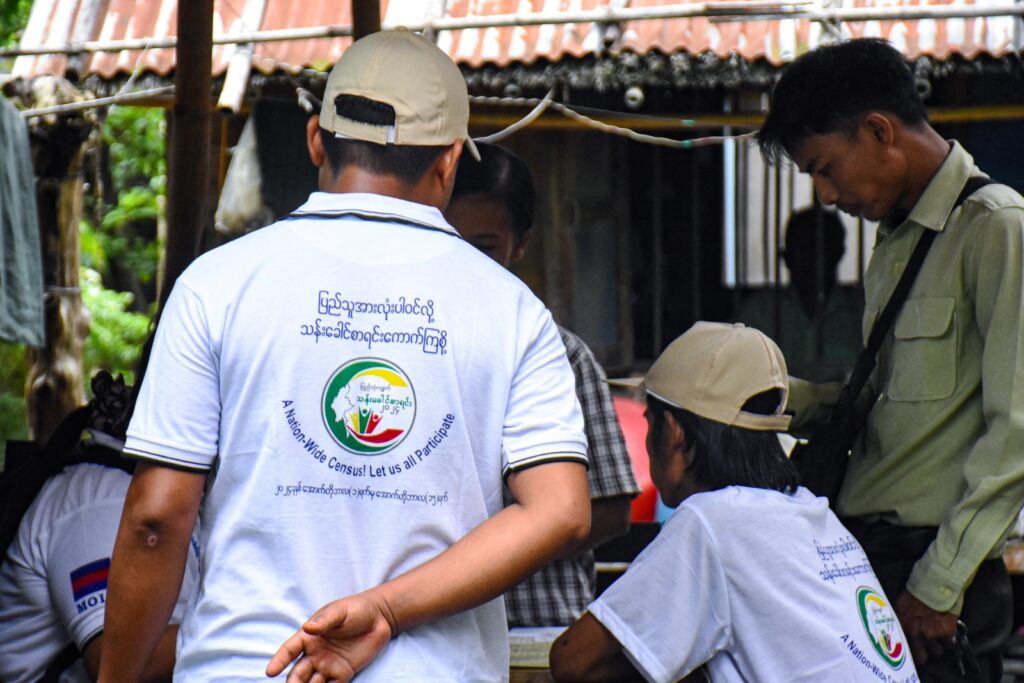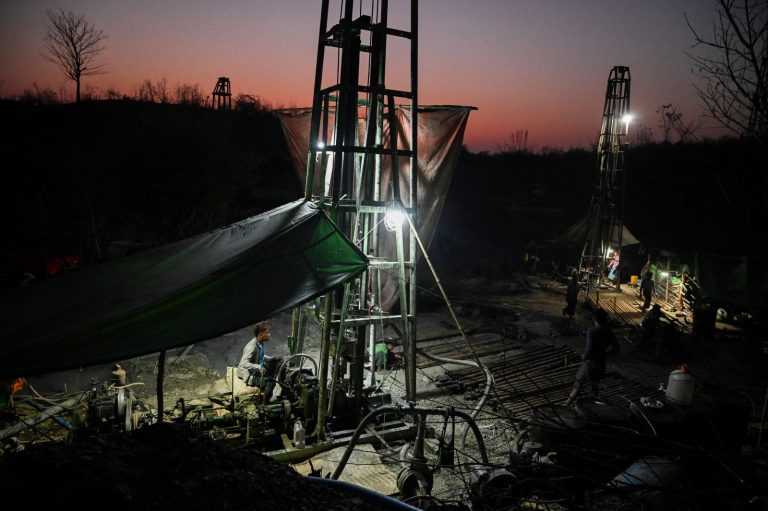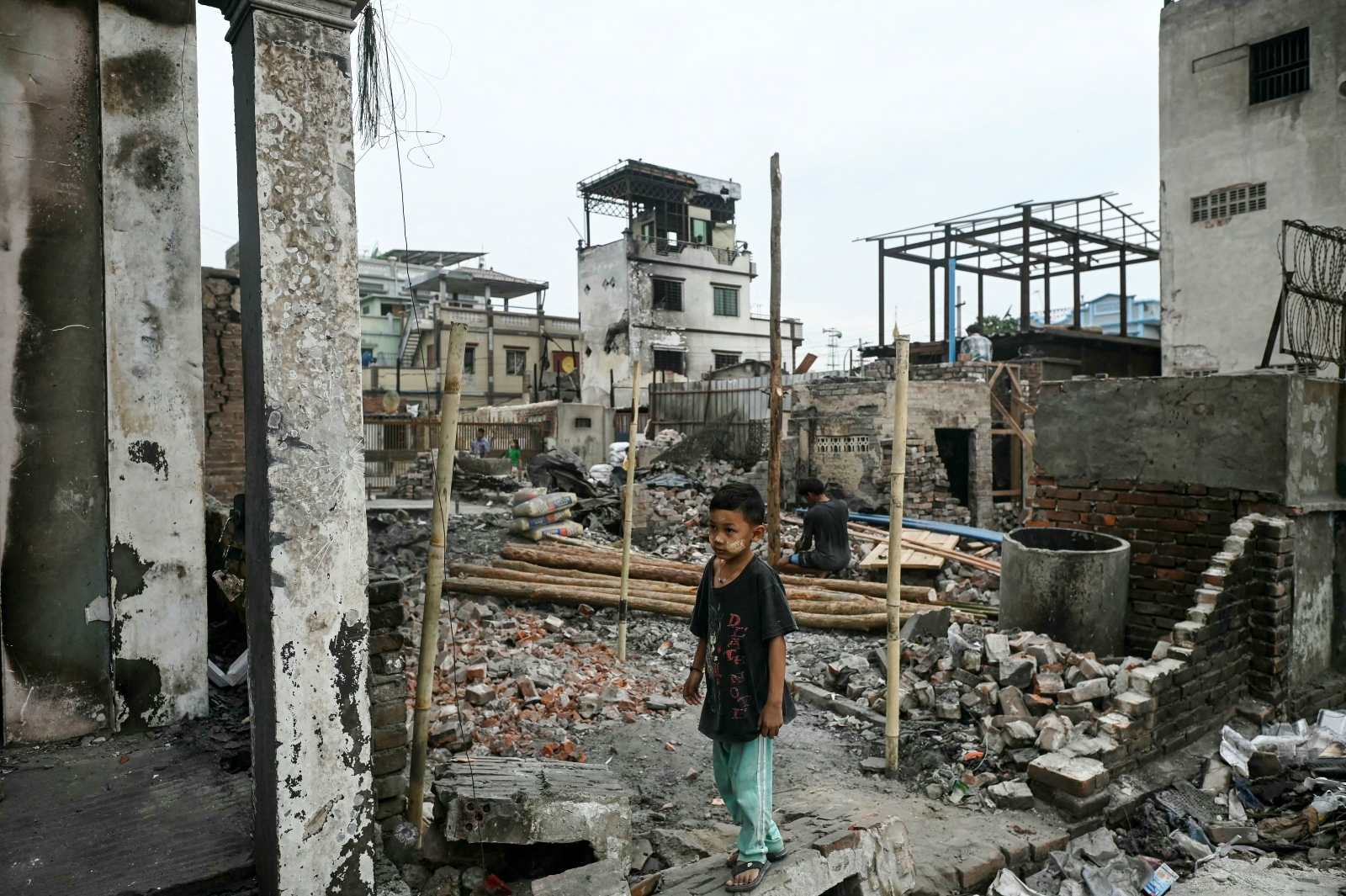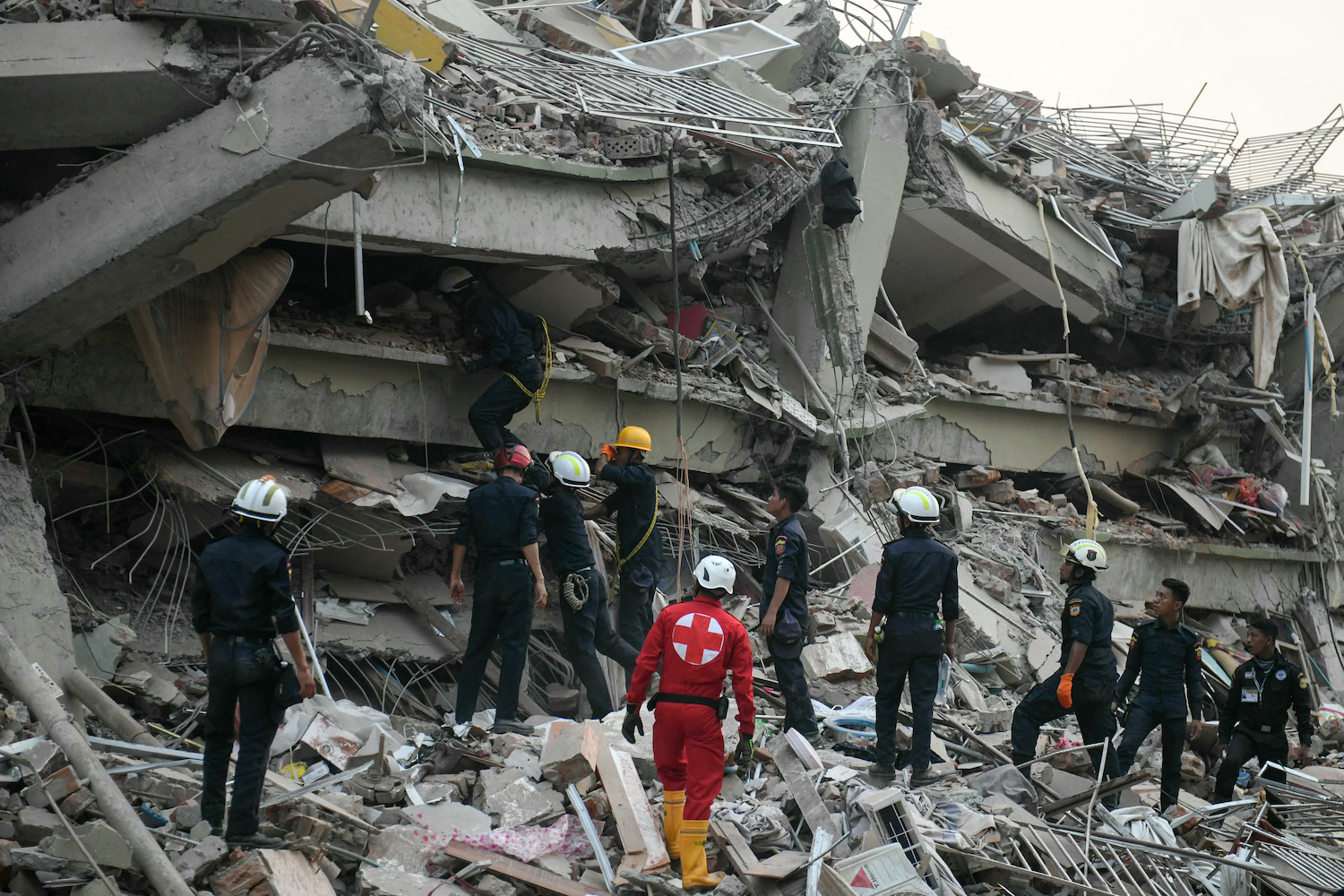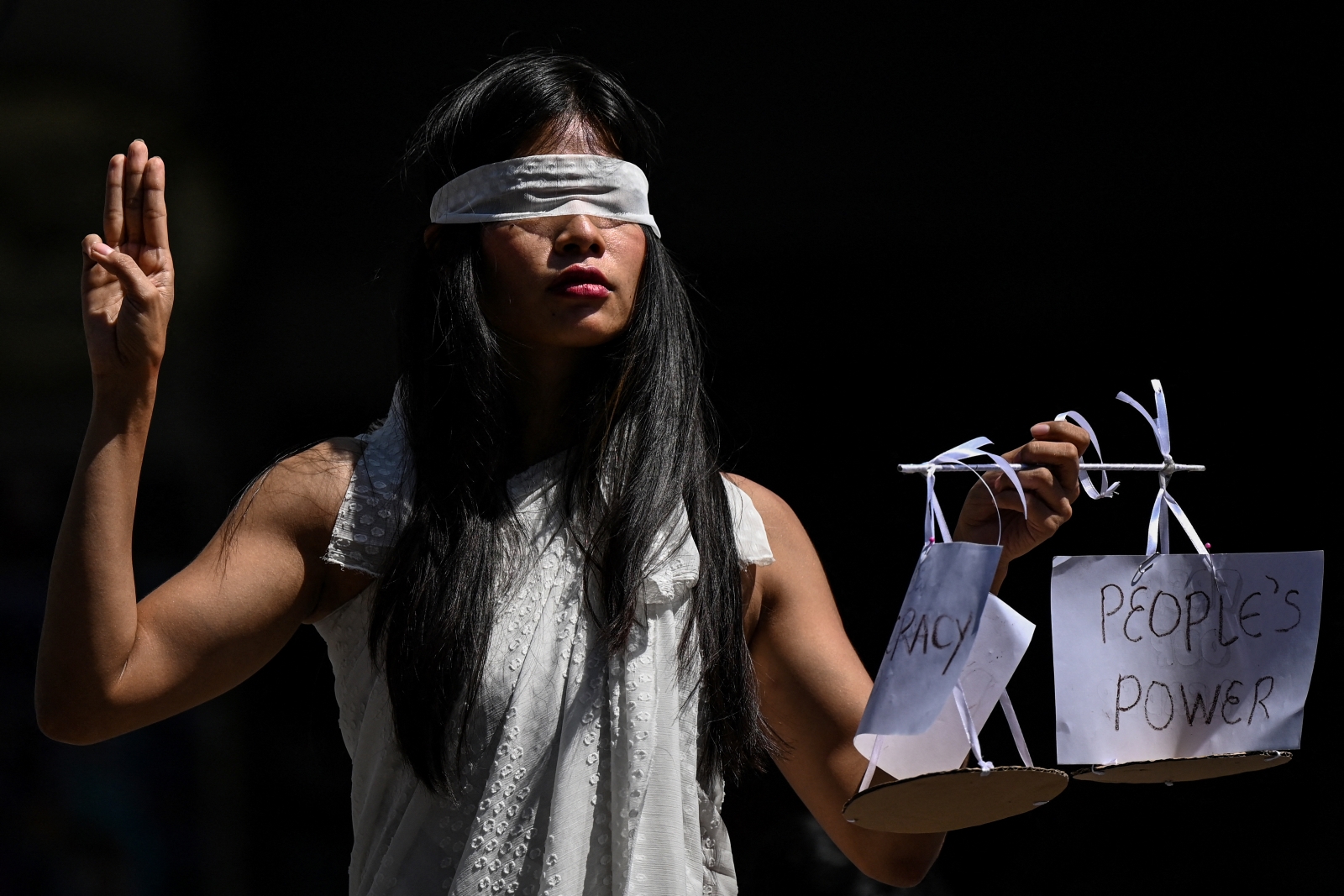Myanmar’s military regime is conducting a controversial population count amid intensifying conflict, putting enumerators and respondents at risk.
By FRONTIER
Morning traffic is common in Yangon, Myanmar’s commercial capital, where motorbikes are banned and roads are often too narrow to accommodate the multitudes heading to work.
But on October 1, stalled commuters were treated to a more unusual sight. Teams of armed soldiers and men in white T-shirts emblazoned with a Myanmar flag were manning checkpoints, causing traffic pileups as they carefully inspected drivers.
The junta had just kicked off its nationwide census, deploying security teams to protect enumerators – often women teachers forced into service – against the backdrop of threats by resistance forces. One of those security teams had set up a 10-man checkpoint at the entrance of a ward in the working class West Hlaing Tharyar Township.
“The men with white T-shirts are local thugs from the ward, minions of the ward administrator,” a street vendor told Frontier. “They’re blocking the ward and demanding personal data.”
This year’s “census” is not anonymous, contrary to international norms. Moreover, while Myanmar’s census law says the data can’t be used for other administrative purposes, the regime says it will help in creating a voter list for an election. Many view the vote, vaguely planned for November next year, an attempt to legitimise military rule rather than return Myanmar to democracy. Critics also warn the current population count has another, even more nefarious purpose: to flush out dissidents.
This has made the census a flashpoint for violence. The subsequent need for security has become a drag on the enumeration process, which is scheduled to run from October 1 to October 15. A member of an administration team in East Hlaing Tharyar Township’s Shanchaung ward told Frontier that enumerators have to wait until there’s a security team available to protect them, causing delays.
“The enumerators have to conduct the census with the security team, so I think they will move slowly. For instance, if the soldiers can only provide security at ward 10 today, other wards have to wait until there are soldiers available,” he said.
The count is also progressing slowly elsewhere, due to a shortage of manpower. According to the regime’s Ministry of Immigration and Population, about 42,000 enumerators are working nationwide on the census, compared to 110,000 in 2014.
In Ayeyarwady Region, the enumeration teams are smaller than those deployed during the previous census, and they have to visit more households.
A teacher who worked as an enumerator in 2014 in Ayeyarwady Region’s Danubyu Township said each team of three was assigned to cover two villages out of eight in the village tract. In contrast, today one team of two enumerators has been assigned to conduct the census in all eight villages.
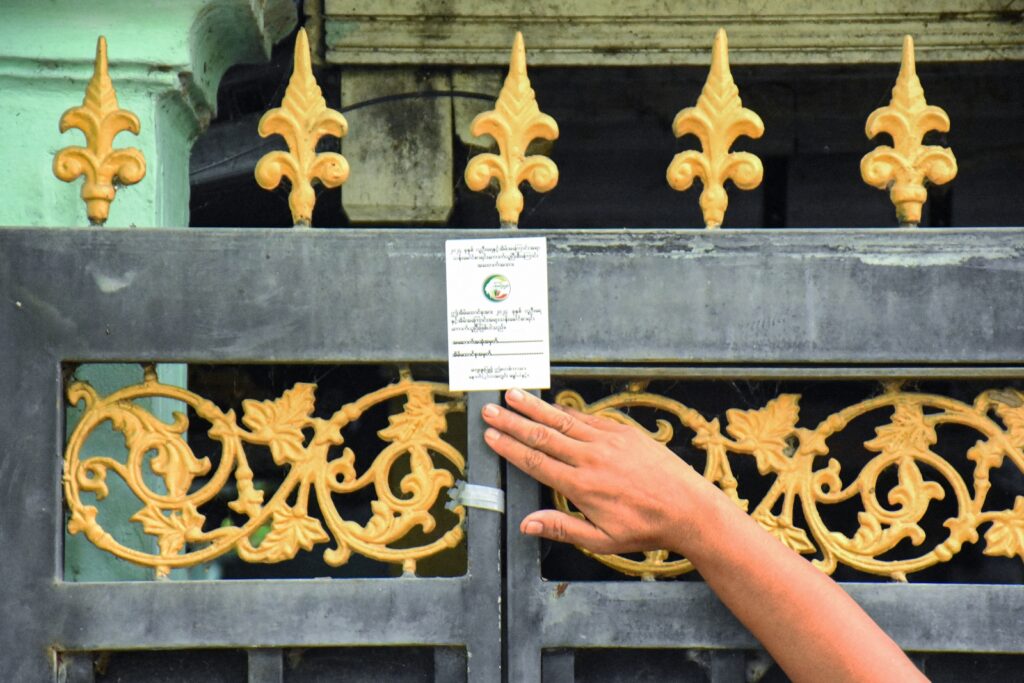
A contentious count
The security concerns for the enumerators are real. After the military seized power in a 2021 coup, the political crisis morphed into armed conflict. Newly-formed pro-democracy militias and longstanding ethnic armed groups have seized huge swathes of territory, while targeted assassinations of low-level regime officials have become routine.
In the country’s west, the Arakan Army has seized most of Rakhine State after fighting resumed in November last year, leaving the military only able to conduct the census in a handful of isolated towns.
“There only a few towns left where the regime is able to collect data,” U Pe Than, a former member of parliament for the Arakan National Party, told Frontier. “It’s impossible to conduct a census in Rakhine State, the AA will not allow it and the people are just not interested.”
The danger is even greater in contested areas.
On Thursday, soldiers providing security for the census were reportedly killed in an improvised explosive device attack in Mandalay Region’s Yamethin Township and a rocket-propelled grenade attack in Kayin State’s Hpa-an Township. Two police officers were also killed on Tuesday in Sagaing Region’s Monywa town.
While all of the fatalities reported thus far have been members of the security forces, enumerators are also facing alleged abuses.
Members of a census team were reportedly beaten and robbed by unknown assailants in Mandalay’s Meiktila town. The Launglon PDF abducted nine census takers – mostly women teachers – in Tanintharyi Region’s Launglon Township. The Launglon PDF is affiliated with the National Unity Government, a parallel administration appointed by elected lawmakers deposed in the coup.
Attacking civil servants is generally considered a violation of international law. But the census is almost certainly being conducted as an intelligence gathering exercise to flush out resistance fighters, activists and striking civil servants. Therefore, some resistance groups insist it’s a legitimate military target.
“We have said that there are no enemy civilians for us. We don’t mind if they help us or not, even if they don’t support us, they are our civilians,” said Ko Nat Mauk, a spokesperson for the Taungoo District Battalion 3501, a PDF under the NUG operating in Bago Region.
“However, if they collect the people’s data and send it to the junta, we will complain to the [NUG] defence ministry, present the relevant evidence and treat them as a military target.”
But other anti-regime figures disagree, given the enumerators have little choice but to participate.
Ko Kyaw Ko Ko, prominent activist and former chair of the All Burma Federation of Student Unions, said that teachers participating in the census should not be targeted because they cannot refuse to work for the regime.
“It’s very dangerous for [the enumerators], because many people from both sides have weapons. Nobody will take responsibility if someone shoots them. Even the NUG has no power to stop that, because many armed groups are not under its command,” he said. “In terms of human rights, I absolutely do not support targeting unarmed civilians.”
NUG spokesperson U Kyaw Zaw did not respond to directly to questions about whether the parallel government endorses attacks on enumerators.
“The NUG has already stated that the regime is the enemy of the state and a terrorist group. We would like to warn the staff involved in the census that they will be punished according to the law,” he told Frontier. “We have the right to take legal action against those who are cooperating with the enemy of the state and do the junta’s bidding.”
“The terrorist military council is working on a census to oppress the public. They are collecting data to monitor the public, especially those who are involved with or support the revolutionary forces. It’s just a deliberate act of injustice to oppress and control the public. They are not a legitimate organisation, so they have no right to do this,” he added.
Forced to serve
The threats have created an atmosphere of fear among the enumerators, many of whom have been forced or pressured into serving.
Daw Thuzar Aye, a primary school teacher at a village in Ayeyarwady’s Danubyu Township, was informed by her principal in the second week of September that she would have to work on the census.
The 40-year-old teacher, who asked to be identified by a pseudonym, protested that she was not familiar with the Chinese tablets being used to input information gathered during the census. But the principal dismissed her concerns and replied that she had been chosen by the township’s education department.
“I’m not happy about it at all, but I can’t say no,” she told Frontier.
Thuzar Aye also complained about the financial burden. She had to spend at least K10,000 (US$2 at the market rate) on transportation every day to attend a 10-day training in Danubyu town, which is 10 kilometres from her village. The Ministry of Immigration and Population promised to give her a daily allowance of K4,000, but she hasn’t received it yet.
“The trainers told us it’s because the township department has not received the money from the headquarters. So I had to spend all that money out of my pocket, and my salary is just K240,000 per month,” she said.
Meanwhile, other schools have used a lottery system to pick enumerators. A primary school principal in Yangon’s North Dagon Township said that she asked for volunteers, but no one stepped up because they were afraid, so she did a random draw.
“Two teachers in their 40s and 50s were selected in the draw. Both are struggling to use the tablets. But we cannot help because there is no one who wants to go instead of them,” the principal said.
Thuzar Aye said some trainees were dismissed during the training because they couldn’t use the tablets, increasing the burden for the remaining enumerators. Others complained about the quality of the devices, saying they are slow and have a short battery life.
“They didn’t replace the people they dismissed. They just said the people who were left would have to step in and conduct the census in the areas assigned to them,” Thuzar Aye said.
Another teacher, in Ayeyarwady’s Maubin Township, told Frontier she was afraid to work without a security detail, but the security team provided has been rude and demanding.
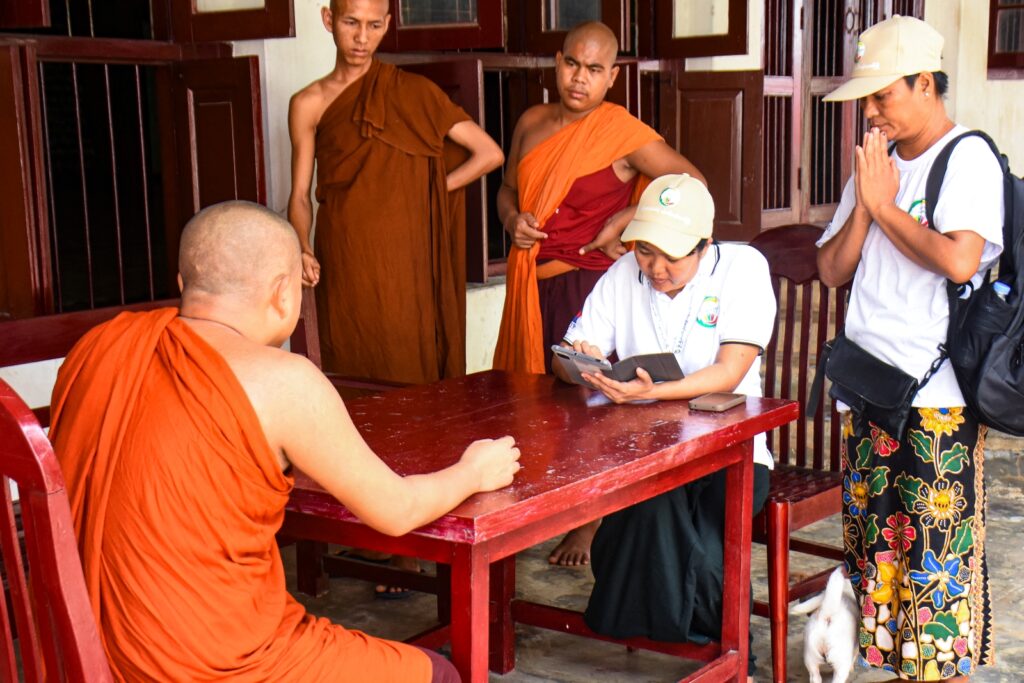
Intimidation tactics
The enumerators aren’t the only ones left feeling scared. Respondents described an intimidating experience being quizzed by enumerators surrounded by armed guards and rude regime officials.
A resident of Yangon’s East Hlaing Tharyar told Frontier that although the soldiers stood outside during the census, the members of his ward’s administration team were intrusive and aggressive.
“They kept telling us to answer truthfully, and to answer quickly. Although they first said they would only ask questions about the people staying at home, they asked many questions about people in my household list who are not currently at home,” he said. “I didn’t want to talk about my son who is now working in Malaysia, but I had to show my household list, and they asked me all kinds of questions about him.”
This year’s census contains 68 questions, in contrast to the 41 in 2014. Many of the new questions seem designed to gather information about individuals on the household list who aren’t at home. This could apply to both resistance fighters, who have relocated to the battlefield, or migrant workers, whom the regime is increasingly trying to squeeze for remittances.
One new question asks about students dropping out of school – which could target both young people in the resistance and those boycotting public institutions in protest against the coup. Another new question asks for the cause of death of any deceased household member, giving “terrorism” as an option. The regime has designated some post-coup groups and ethnic armed groups as terrorist organisations.
Some have speculated that new questions about disabilities could be related to the regime’s conscription drive, activated in February. A resident of Ayeyarwady’s Yegyi Township said that he had to explain the health situation of all family members, including his two sons, aged 17 and 19.
“They asked if each family member has difficulties hearing, seeing, moving, remembering, taking care of themselves, and communicating with others. It’s information they could use while summoning people for conscription. I’m worried about my sons,” he said.
Ko Yay Ba Well, founder of Yangon-based youth activist group OCTOPUS, suggested that people avoid answering questions as much as they can.
“The military cannot operate in ethnic areas and areas controlled by revolutionary forces, but in urban areas such as Yangon, Mandalay and Nay Pyi Taw, where the military is still in control, we need to stand together and avoid the census.”
Yay Ba Well suggested leaving home the day the enumerators visit or answering “I don’t know” for delicate questions such as those pertaining to people in the household living somewhere else.
But that’s easier said than done.
“We had been informed that at least one person must wait in each house on the day the enumerators visit,” said the father in Yegyi. “They threatened us that they will take action if we aren’t at home, and the local administration never hesitates to arrest people. So no one dares to avoid the census.”


